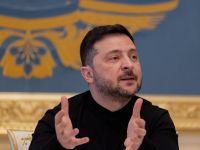NATO foreign ministers struggled Friday to overcome Turkish concerns over defining the Atlantic alliance's relations with the European Union and its 60,000-strong rapid reaction force, but made little headway, officials said.
A brief morning meeting -- prior to a Euro-Atlantic Partnership Council meeting with 27 peers from non-NATO nations, including Russian Foreign Minister Igor Ivanov -- ended with no decision.
Instead the foreign ministers threw the deadlock back to their diplomats to wrestle with, and agreed to reconvene at 2:30 PM (1330 GMT) to see if a breakthrough was in the offing.
"This is a problem. It is not a crisis," a NATO official said, adding that the foreign ministers were under no deadline to reach a consensus which NATO ambassadors could still pursue in the new year.
A Turkish source agreed. "There is some movement," he said, "but what is most important is to get it right."
US officials were hoping to get at least a general framework for EU-NATO relations in place before president-elect George W. Bush takes office next month.
Extended talks Thursday failed to win Turkey's support for full-time EU access to NATO planning for the 60,000-man European rapid reaction force that is to be in place in 2003.
Turkey, an EU candidate state close to Balkan and Central Asian hotspots where the EU force could well intervene, prefers such access be granted on a case by case basis.
Diplomats reported "a lively exchange of views," but most doubted that the meeting will produce much more than a broad statement of support for the Europeans' quest to boost their defense capabilities.
"We may not get there," one official said. "But there has been important progress."
Participating in the discussions is US Secretary of State Madeleine Albright, attending one of her last high-level meetings before the Clinton administration bows out.
Both the European Union and most of the 19 NATO allies are in favor of granting Brussels permanent access to NATO's time-tested operational planning -- a scheme that would also let the United States keep a watchful eye on EU military actions.
The United States is also said to favor more regular meetings of EU and NATO ministers and officials than the Europeans have suggested.
It has repeatedly said that it does not want to see the European Union develop its own military structures that might wind up competing with NATO and undermining a half-century of trans-Atlantic collective security.
The EU force -- actually a pooling of existing national capabilities -- would be able to hop into Balkan-like hotspots on 60 days' notice for humanitarian, peacekeeping or crisis management missions.
Later Friday the NATO foreign ministers were to sit down with Ivanov, pursuing a rapprochement with Moscow after relations were ruptured during NATO's air war against Yugoslavia over Kosovo last year -- BRUSSELS (AFP)
NATO hopes the mood will be good enough to proceed with the reopening of an information center in the Russian capital.
Friday's work will finish with an unprecedented dinner bringing together the 19 NATO foreign ministers and their colleagues from the four non-NATO EU member states -- Sweden, Finland, Austria and Ireland.
"This will be a truly historic event," said NATO Secretary General Lord George Robertson, talking up what he called a key moment on the way to a renewed Euro-Atlantic relationship.
Albright and Ivanov were to breakfast together Saturday at a Brussels hotel, US officials said.
rom/ml
© 2000 Al Bawaba (www.albawaba.com)







